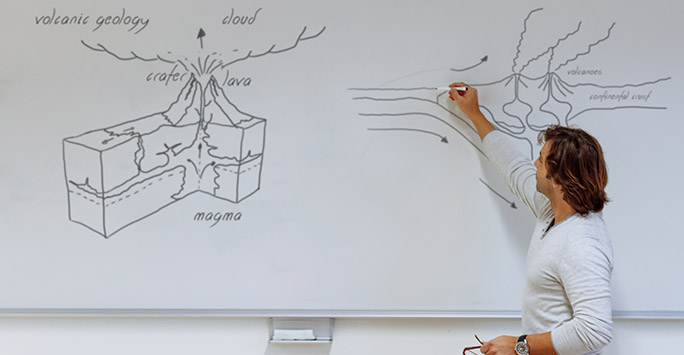Engaging next-generation geoscientists by supporting high-quality teaching
In the UK, many geology teachers are working in isolation in schools and colleges, making it hard for them to update their knowledge and skills. For 30 years, the University of Liverpool has been bringing geology teachers across the UK together and supporting them to deliver inspiring A-Level geology lessons. Influenced by the latest research in the field, the annual Continuing Professional Development (CPD) course is specifically designed for A-Level geology teachers and aligns with the course syllabus and examination specifications.
The challenge
From natural hazards to natural resources, environmental engineering, pollution control and environmental planning, these are just a few examples of the central role that geologists have in society. However, the latest Tier 2 Shortage Occupation List published by the UK government includes many geoscience-related jobs, indicating increased demand for top-level expertise.
More than 40% of applicants for undergraduate geology degrees have studied A-Level geology, making it an important channel to increase interest in the field and present the wide array of career pathways open for geoscience graduates.
The high-quality topical content and multidisciplinary approach provided by the A-Level geology curriculum plays a significant role in engaging aspiring future geologists. Academics in Earth Sciences at the University of Liverpool are ensuring that Geology teachers have the support they need to deliver pioneering geology teaching.
Research action
The annual CPD training course and educational online resource GeoHub Liverpool was designed by the University of Liverpool to match A-Level geology examination specifications. The course brings geology teachers together, building a strong UK-wide geoscience community that supports innovative curriculum delivery and sharing of best practice. The course is delivered through seminars, practical sessions and fieldwork activities provided by lecturers from the University of Liverpool, who are at the cutting edge of research in geoscience.
As an open-access online educational resource, GeoHub Liverpool provides teaching materials such as videos of technical skills that can be used by students, or by teachers directly in the classroom all year round.
Working in partnership
The University of Liverpool geology CPD course is endorsed by the Geological Society of London, the leading organisation of professional geologists in the UK. The University of Liverpool also has a close partnership with the Earth Science Teachers’ Association (ESTA), which is the national teaching body supporting the teaching of Earth sciences at all levels.
Liverpool’s geology group is also actively involved in outreach activities that are open for the wider community and general public. A student-led research conference, the Herdman Symposium, contributes international expert speakers from across the Earth Sciences, presenting research findings in an accessible way to school and college students and local interest groups such as the Liverpool Geological Society.
Outputs and outcomes
Liverpool’s CPD course for A-Level geology teachers has engaged leaders in curriculum development, contributing to the content update of the geology A-Level curriculum and exam specifications. The course is updated every two years, responding to changes in the A-Level curricula and facilitating its delivery. As a result, the course draws new delegates every year and the close collaboration built between teachers and academics informs future teaching materials, addressing teacher requirements and A-Level students’ skills development.
Additional year-round engagement activities to support teaching include A-Level revision sessions, school visits to Liverpool undergraduate teaching facilities and field excursions. The University also provides teaching equipment such as polarising microscopes, geological teaching samples and geological maps directly to schools.

Geology CPD course
Liverpool’s CPD course for A-Level geology teachers is well-regarded in the geoscience community, inspiring young people to meet exciting employment opportunities in the field.